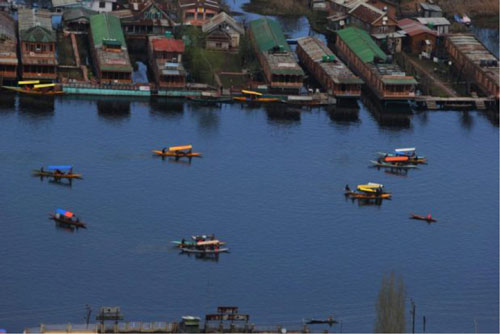AFTER rowing a shikara for three decades in Srina-gar’s picturesque Dal Lake, Ali Mohammad took a loan of five lakh in 2019, for repairing his shikara and renovating his house.
Three years later, the 55-year-old hasn’t been able to repay the debt. Consecutive lockdowns since the August 2019 clampdown, followed by the Covid-19 pandemic in March 2020, have gutted the regional economy and battered “poor people”, said Mohammad.
“Whenever the situation in Kashmir gets worse, us — the poor — suffer not the rich,” he told The Kashmir Walla, “who have food on their plates anyway.”
Even after the markets reopened later in 2020, the crippling impact of successive lockdowns made it difficult for businesses to spring back.
Between June 2020 and March 2021, according to the Centre for Monitoring Indian Economy (CMIE), more than five lakh — 5,69,476 to be precise — lost their livelihood.
Mohammad was one of them. As soon as he realised that he won’t be able to feed his family by sitting on an empty shikara, he left his home to work as a manual laborer, for 500 rupees a day. Sometimes less.
And for thousands others, the perpetual struggle as they swing between near-constant lockdowns and clampdowns continue.
Though a constant nudging by New Delhi and high profile endorsements, Kashmir’s tourism is reported to have been surging with increasing tourist footfall, Mohammad said “not so much”.
His earnings helped him to feed his family. But other aspects of life, including the education of his two children, have taken the fall.
“Where should I get the money? We have been sitting for the past two years,” Mohammad said of the school, which demands a full payment upfront to let the children in. “How do they expect me to pay them money?”
Wahid Malik, President of Kashmir Hotel and Restaurant Owners Federation, said that after the abrogation of the Article 370, the tourism sector is seeing a downfall along many levels.
“Ever since, it has remained the same.
This is the time of survival, there is absolutely no business,” he said, adding the tourists who visit the valley right now are the high end tourists, a chunk of those who couldn’t travel abroad, – and the business is favoring five-star and four-star hotels.
In Kashmir, he said, there are almost 1500 hotels which comprise six to eight five-star hotels, consisting of 400 rooms. The remaining hotels are a mix of grade A,B,C and D hotels, he said.
The A-category hotels cater to the people who do not spend too much. Their business is running almost 15-20 percent as compared to the pre-August 2019, claimed Malik.
He said that the majority of the hotels are trying to survive adding that they had requested the government authorities to lower the tariffs and other charges because there has been no business.
Everytime, there is a loss in the business, thousands of people associated with the trade get affected too, said Sheikh Ashiq, President of Kashmir Chamber of Commerce and Industries (KCCI). “More than five lakh people associated with the tourism sector were unemployed,” he said.
According to the KCCI, the total monetary loss during the lockdown was as high as 50,000 crore rupees.
Shabir Ahmad Sheikh, 30, bought an auto rickshaw in February 2020. But the Covid restrictions kept him at home. A few months later, he sold the vehicle.
“I had to do something and my auto wasn’t helping. So, I sold it and started doing labour work,” he said.
Matt Shabir Ahmad, Chairman, All Kashmir Transporters Welfare Association, said that ever since 2019, the transport sector has taken a bitter hit.
When the lockdown reopened gradually, the skyrocketing fuel prices threw new challenges at the community.
Shabir said that the government, and local administration, did not even come forward to help the struggling community. “We have talked to the divisional commissioner and requested him to weave off the tax,” he said.
“I’m hopeful that the administration will look into it but I’m apprehensive about the fate of the community.”—KMS










